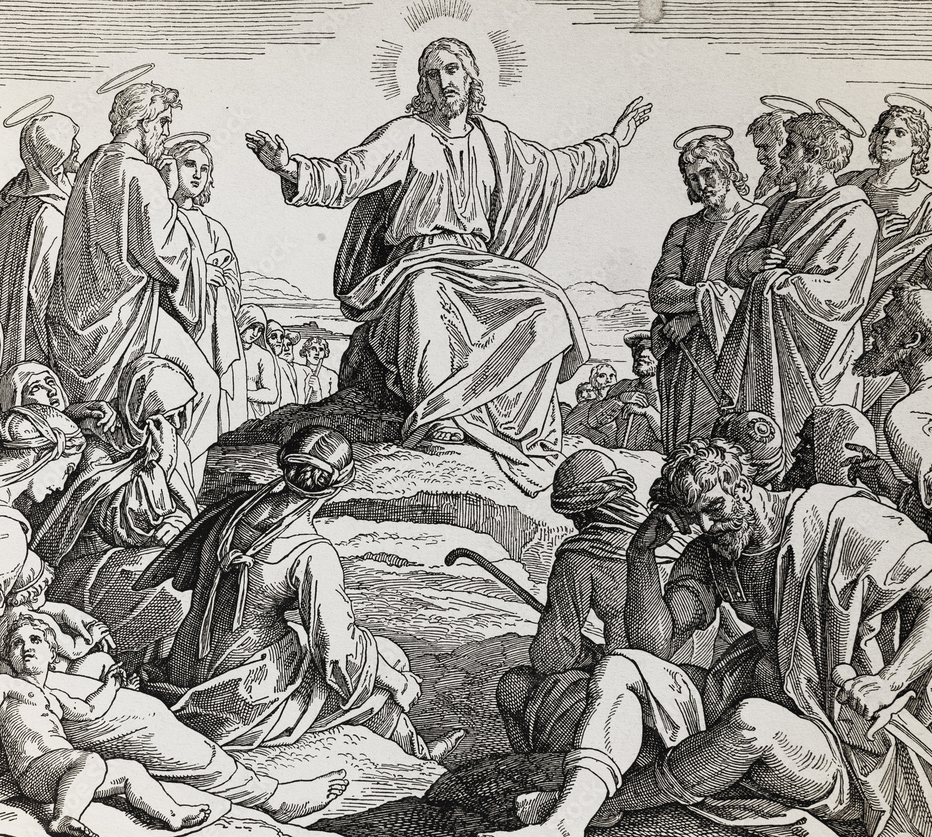Christian Art | Prayer With Jesus | Baptism
Office Of Readings | Week 15, Sunday, Ordinary Time | A Reading From The Treatise Of Saint Ambrose On The Mysteries | Instruction On The Ceremonies Preceding Baptism
‘Catechesis on the rites preceding baptism.’
In this opening section of On the Mysteries, Saint Ambrose provides catechetical instruction to the newly baptized (the neophytes) during the Easter season. His words reveal both the rich theological meaning and the pastoral care embedded in the early Church’s liturgical practices.
Pedagogy Of Sacred History
Saint Ambrose begins by recalling the preparatory instruction given during Lent, using Scripture—particularly the patriarchs and Proverbs—as a moral and spiritual guide. This grounding in sacred history was intended to help catechumens internalise the obedience and faithfulness exemplified by their spiritual ancestors. Ambrose thereby affirms that the path of Christian discipleship is a continuation of God’s covenantal relationship with His people.
The Discipline Of The ‘Mysteries’
Ambrose then underscores an important principle of early Christian practice: the discipline of the arcana (secrecy regarding the sacraments). To reveal the full depth of sacramental theology before initiation would, in Ambrose’s view, have been a betrayal rather than instruction. His respect for the element of mystery highlights the early Church’s understanding that sacramental realities are best encountered through participation rather than mere intellectual comprehension.
This approach reflects a profound pastoral insight: some truths are properly grasped only through living experience. Thus, Ambrose invites his audience to ‘open their ears’ and ‘enjoy the fragrance of eternal life’—a beautifully poetic image suggesting that participation in the sacraments engages the whole person, not just the intellect.
The Rite Of ‘Effetha’
Ambrose focuses on the Effetha rite, drawing a parallel between the Gospel account of Jesus healing the deaf and mute man and the ritual performed before baptism. This rite symbolises the opening of the senses to faith, preparing the candidate to hear God’s Word and confess it publicly. The gesture serves both as a physical sign and a spiritual awakening, marking a transformative moment in the catechumen’s journey.
Liturgical Setting And The Role Of Ministers
Saint Ambrose draws attention to the roles of ministers—levite, priest, high priest—not merely as individuals, but as bearers of grace through their sacred offices. He cautions the neophytes not to judge these ministers superficially but to recognise their spiritual authority and the divine grace conferred through their ministry. This theological point reinforces the sacramental understanding of ordination: it is Christ who acts through the ordained minister, regardless of personal merit.
Renunciation Of The Devil And Orientation To Christ
A powerful image follows: the candidate turns from the west (associated with darkness and the devil) towards the east (symbolising light and Christ). This ritual gesture embodies the core of baptismal conversion: a turning away from sin and a turning towards the risen Christ. Ambrose emphasises the personal and public nature of this renunciation, reminding the neophytes that their words are recorded ‘not on a monument to the dead but in the book of the living’.
In this way, Ambrose weaves together Scripture, liturgy, theology, and moral exhortation, creating a vibrant tapestry of instruction that helped the newly baptized understand the profound transformation they had undergone.

A Reading From The Treatise Of Saint Ambrose On The Mysteries | Instruction On The Ceremonies Preceding Baptism
We gave a daily instruction on right conduct when the readings were taken from the history of the patriarchs or the maxims of Proverbs. These readings were intended to instruct and train you, so that you might grow accustomed to the ways of our forefathers, entering into their paths and walking in their footsteps, in obedience to God’s commands.
Now the season reminds us that we must speak of the mysteries, setting forth the meaning of the sacraments. If we had thought fit to teach these things to those not yet initiated through baptism, we should be considered traitors rather than teachers. Then, too, the light of the mysteries is of itself more effective where people do not know what to expect than where some instruction has been given beforehand.
Open then your ears. Enjoy the fragrance of eternal life, breathed on you by means of the sacraments. We explained this to you as we celebrated the mystery of ‘the opening’ when we said: Effetha, that is, be opened. Everyone who was to come for the grace of baptism had to understand what he was to be asked, and must remember what he was to answer. This mystery was celebrated by Christ when he healed the man who was deaf and dumb, in the Gospel which we proclaimed to you.
After this, the holy of holies was opened up for you; you entered into the sacred place of regeneration. Recall what you were asked; remember what you answered. You renounced the devil and his works, the world and its dissipation and sensuality. Your words are recorded, not on a monument to the dead but in the book of the living.
There you saw the levite, you saw the priest, you saw the high priest. Do not consider their outward form but the grace given by their ministries. You spoke in the presence of angels, as it is written: The lips of a priest guard knowledge, and men seek the law from his mouth, for he is the angel of the Lord almighty. There is no room for deception, no room for denial. He is an angel whose message is the kingdom of Christ and eternal life. You must judge him, not by his appearance but by his office. Remember what he handed on to you, weigh up his value, and so acknowledge his standing.
You entered to confront your enemy, for you intended to renounce him to his face. You turned towards the east, for one who renounces the devil turns towards Christ and fixes his gaze directly on him.
Prayer With Jesus
Lord Jesus Christ,
You are the true light who illumines all who turn to you.
As you opened the ears of the deaf and the lips of the mute,
so open our hearts to hear your word and to proclaim your praise.
May we who have been baptized into your death and resurrection
renounce the works of darkness and walk always towards the east,
fixing our gaze upon you, the sun of righteousness.
Strengthen all those who minister in your Church
so that, through their faithful service,
Your grace may continue to transform lives.
Grant us the courage to live as your faithful people,
writing your commandments not on stone but upon our hearts,
so that we may joyfully enter the gates of righteousness
and offer you pure worship.
Through you, who live and reign with the Father and the Holy Spirit,
God forever and ever. Amen.
Glossary Of Christian Terms
Catechumens: Individuals preparing for baptism, often instructed in the faith during Lent.
Neophytes: Newly baptized Christians, especially those baptized at the Easter Vigil.
Effetha: A rite in the baptismal liturgy, from the Aramaic word meaning ‘be opened’, recalling Jesus’ healing of the deaf and mute man (Mark 7:34).
Discipline of the arcana: The early Christian practice of maintaining secrecy about the details of sacramental rites until after baptism.
Levitical, priestly and high priestly roles: References to ministers of the Church, viewed as fulfilling roles prefigured in the Old Testament priesthood but fulfilled in Christ.
East/Orient: Symbolic of Christ as the light and the direction towards which early Christians would turn during certain rites, signifying conversion and enlightenment.
Sun of Righteousness: A title for Christ, drawn from Malachi 4:2, symbolising his life-giving light.
Sacrament of regeneration: A term for baptism, emphasising its role as the moment of spiritual rebirth.
Book of the living: Biblical imagery denoting those who belong to God (cf. Psalm 69:28; Revelation 3:5).
Mystagogical catechesis: Instruction given to the newly baptized to explain the mysteries (sacraments) they have received.







